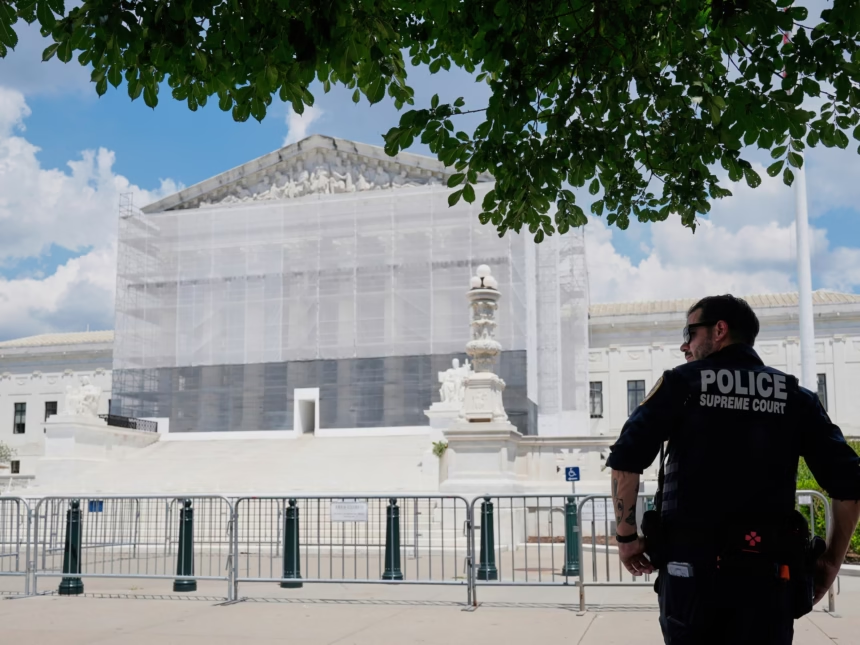The United States Supreme Court has ended its latest term with a host of blockbuster decisions, touching on everything from healthcare coverage to school reading lists.
On Friday, the court issued the final decisions of the 2024 term before it takes several months of recess. The nine justices on its bench will reconvene in October.
But before their departure, the justices made headlines. In a major victory for the administration of President Donald Trump, the six-person conservative majority decided to limit the ability of courts to issue universal injunctions that would block executive actions nationwide.
Trump has long denounced court injunctions as an attack on his executive authority.
In two other rulings, the Supreme Court’s conservative majority again banded together. One decision allowed parents to opt out of school materials that include LGBTQ themes, while the other gave the go-ahead to Texas to place barriers to prevent youth from viewing online pornography.
But a decision on healthcare access saw some conservative justices align with their three left-wing colleagues. Here is an overview of their final rulings of the 2024 term.
Court upholds preventive care requirements
In the case of Kennedy v Braidwood Management, the Supreme Court saw its usual ideological divides fracture.
Three conservative justices – Amy Coney Barrett, Brett Kavanaugh and John Roberts – joined with the court’s liberal branch, represented by Sonia Sotomayor, Ketanji Brown Jackson and Elena Kagan, for a six-to-three ruling.
At stake was the ability of a government task force to determine what kinds of preventive healthcare the country’s insurance providers had to cover.
It was the latest case to challenge the constitutionality of the Affordable Care Act, a piece of legislation passed under former President Barack Obama to expand healthcare access.
This case focused on a section of the act that allowed a panel of health experts – under the Department of Health and Human Services – to determine what preventive services should be covered at no cost.
A group of individuals and Christian-owned businesses had challenged the legality of that task force, though.
They argued that the expert panel was a violation of the Appointments Clause, a section of the Constitution that requires certain political appointees to be chosen by the president and approved by the Senate.
The group had previously secured an injunction against the task force’s decision that HIV prevention medications be covered as preventive care.
That specific injunction was not weighed in the Supreme Court’s decision. But writing for the majority, Justice Kavanaugh affirmed that the task force was constitutional, because it was made up of “inferior officers” who did not need Senate approval.
Court gives nod to Texas’s age restrictions on porn
Several states, including Texas, require users to verify their age before accessing pornographic websites, with the aim of shielding minors from inappropriate material.
But Texas’s law came under the Supreme Court’s microscope on Friday, in a case called Free Speech Coalition v Ken Paxton.
The Free Speech Coalition is a nonprofit that represents workers in the adult entertainment industry. They sued Texas’s attorney general, Paxton, arguing that the age-verification law would dampen First Amendment rights, which protect the right to free expression, free association and privacy.
The plaintiffs noted the risks posed by sharing personally identifying information online, including the possibility that identifying information like birthdates and sensitive data could be leaked. The American Civil Liberties Union, for instance, warned that Texas’s law “robs people of anonymity”.
Writing for the Supreme Court’s conservative majority, Justice Clarence Thomas acknowledged that “submitting to age verification is a burden on the exercise” of First Amendment rights.
But, he added, “adults have no First Amendment right to avoid age verification” altogether. The majority upheld Texas’s law.
Court affirms children can withdraw from LGBTQ school material
The Supreme Court’s conservative supermajority also continued its streak of religious freedom victories, with a decision in Mahmoud v Taylor.
That case centred on the Montgomery County Board of Education in Maryland, where books portraying LGBTQ themes had been approved for use in primary school curricula.
One text, for example, was a picture book called Love, Violet, which told the story of a young girl mustering the courage to give a Valentine to a female classmate. Another book, titled Pride Puppy, follows a child searching for her lost dog during an annual parade to celebrate LGBTQ pride.
Parents of children in the school district objected to the material on religious grounds, and some books, like Pride Puppy, were eventually withdrawn.
But the board eventually announced it would refuse to allow parents to opt out of the approved material, on the basis that it would create disruptions in the learning environment.
Some education officials also argued that allowing kids to opt out of LGBTQ material would confer a stigma on the people who identify as part of that community – and that LGBTQ people were simply a fact of life.
In the majority’s decision, Justice Samuel Alito asserted that the education board’s policy “conveys that parents’ religious views are not welcome in the ‘fully inclusive environment’ that the Board purports to foster”.
“The curriculum itself also betrays an attempt to impose ideological conformity with specific views on sexuality and gender,” Alito wrote.
Court limits the use of nationwide injunctions
Arguably, the biggest decision of the day was another ruling decided by the Supreme Court’s conservative supermajority.
In the case Trump v CASA, the Trump administration had appealed the use of nationwide injunctions all the way up to the highest court in the land.
At stake was an executive order Trump signed on his first day in office for his second term. That order sought to whittle down the concept of birthright citizenship, a right conferred under the Fourteenth Amendment of the US Constitution.
Previously, birthright citizenship had applied to nearly everyone born on US soil: Regardless of their parents’ nationality, the child would receive US citizenship.
But Trump has denounced that application of birthright citizenship as too broad. In his executive order, he put restrictions on birthright citizenship depending on whether the parents were undocumented immigrants.
Legal challenges erupted as soon as the executive order was published, citing Supreme Court precedent that upheld birthright citizenship regardless of the nationality of the parent. Federal courts in states like Maryland and Washington quickly issued nationwide injunctions to prevent the executive order from taking effect.
The Supreme Court on Friday did not weigh the merits of Trump’s order on birthright citizenship. But it did evaluate a Trump administration petition arguing that the nationwide injunctions were instances of judicial overreach.
The conservative supermajority sided with Trump, saying that injunctions should generally not be universal but instead should focus on relief for the specific plaintiffs at hand. One possible exception, however, would be for class action lawsuits.
Amy Coney Barrett, the court’s latest addition and a Trump appointee, penned the majority’s decision.
“No one disputes that the Executive has a duty to follow the law,” she wrote. “But the Judiciary does not have unbridled authority to enforce this obligation – in fact, sometimes the law prohibits the Judiciary from doing so.”








